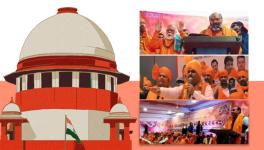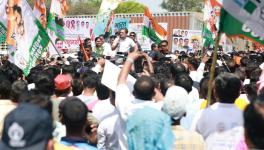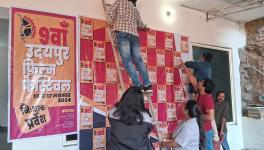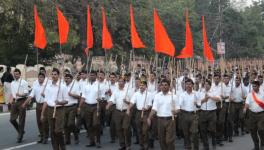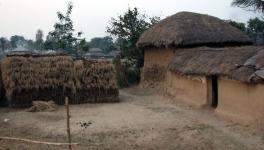Babri Masjid Demolition: Even Sense of Shame has Gone, Says Roop Rekha Verma
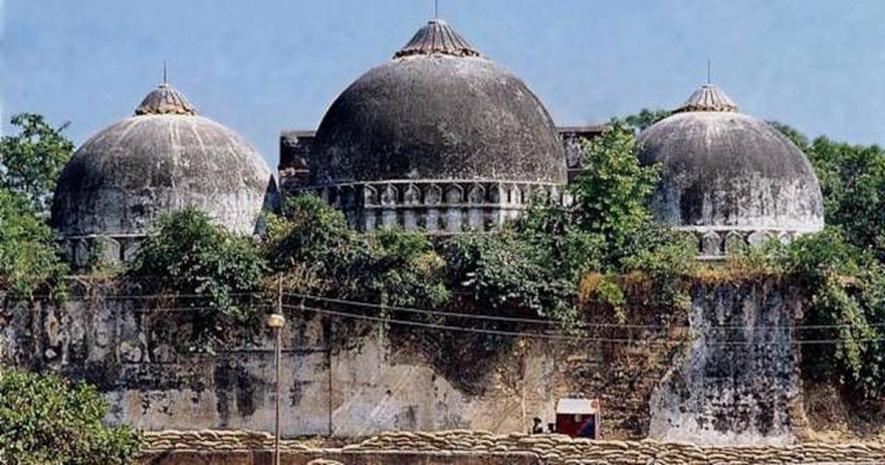
A view of the Babri Masjid in Ayodhya, which was demolished on December 6, 1992. Image Courtesy: Wikimedia Commons
Prof. Roop Rekha Verma, a well-known academic, author, and activist, says the number of people who speak in favour of criminals and hate politics has grown exponentially since the 1992 Babri Masjid demolition. Verma is the former Vice-Chancellor, professor and head of the philosophy department and former Dean of the Faculty of Arts at Lucknow University. She is a petitioner in the Supreme Court case seeking reversal of the remission granted to 11 rapists and murderers in the Bilkis Bano case. Verma also stood surety for jailed journalist Siddique Kappan to help him fulfil his bail conditions. She spoke to NewsClick about the link between India in the nineties and today. In the 30 in-between years, communalism could become widespread, she says, for the votaries of secularism took it for granted while those who espouse Hindu Rashtra actively spread their poison.
Pragya Singh: Thirty years on, what does the Babri Masjid demolition symbolise to you?
Roop Rekha Verma: It symbolises lawlessness, communitarian hostility, rowdyism, and an affront to our Constitution. It represents breaking the essential spirit of the Constitution.
PS: Numerous other mosques are in the cross-hairs of the votaries of Hindutva. What would you say to those who hoped Babri would be the last claim that a mosque was once a temple and Muslim worshippers must relinquish it?
RRV: We should understand the motives of those who started the process which ended with the demolition of the Babri mosque. The speeches and writings of the leaders of the organisation that propagated ideas that led to it destruction are well-documented. Two salient features stand out from this material. That the members of this organisation do not believe in democracy. They consider democracy undesirable. Two, they believe in the caste system and religion-based nationalism. Their idea of a Hindu Rashtra came from their icons, Savarkar and Hegdewar, who proposed that ugly view before Mohammad Ali Jinnah, the founder of Pakistan.
Their dangerous dream of a Hindu nation is super-most in their minds. Before them, the Hindu Mahasabha and Syama Prasad Mukherji propounded such ideas. This is a group of organisations whose dreams are the opposite of what is enshrined in our Constitution. They want the country to return to the pre-colonial period. Not just that. They crave an even older past when India was a conglomeration of small, medium and big monarchies. The only difference is they do not want multiple kings to rule over India but just one monarchy led by one ruler.
They very strongly support the Varnashrama vyavastha. Their aversion to the post-Independence transformations India was attempting is well documented. When the Hindu Code Bill gave rights not enshrined in our religious structure to Hindu women, Mukherji opposed it. Raising the age of marriage, widow remarriage, and rights to dalit and backward sections—the Hindu Mahasabha and the Sangh Parivar people vehemently opposed these. They accused Nehru and his parliamentarians of creating the Hindu Code Bill to destroy Hinduism. They did not just oppose reform. They wanted to deny women and non-elite castes fundamental rights, and thought of this denial as essential to Hindu identity. They espoused a restrictive and narrow-minded construction of nationhood and a negative and backward construction of Hinduism.
For them, demolishing the Babri mosque was only one step to teaching the minorities that India is not their nation. The Jana Sangh, the previous form of the Bharatiya Janata Party (BJP) knew there was no proof that the central dome of the Babri masjid marks the spot where Lord Rama was born—they conducted the Ram temple movement in the name of religion, but it was purely a political project.
PS: And is that why they continue seeking new sites to stoke conflicts between Hindus and Muslims?
RRV: That is precisely why they want to keep the minorities in constant fear and compromise their citizenship.
PS: But what do ordinary Hindus gain from this?
RRV: This is a psychological and emotional project rather than rational. Conflict is stoked to send the signal that Hindus are one. After all, those who vocally oppose acts like demolitions and want those responsible for hate crimes punished are Hindus. The question is not what Hindus gain from this brand of politics. It is what those who pursue this politics gain from it. The problem is that we have our Utopia enshrined in the Constitution, but their Utopia is in narrowly interpreting religion and the Constitution.
Ironically, they are following the same political goals as the countries they keep pointing fingers at as being narrow-minded, repressive and backward. Their number one target and enemy is Pakistan, which they justify by saying it gives no rights to women, encourages religious fundamentalism, etc. But, step by step, this government is adopting the measures taken in Pakistan over the years. I think this is because, in their hearts, they admire how Pakistan has restricted the rights of minorities, women, and weaker sections. But for the sake of political mileage, they criticise Pakistan. This is the duality and contradiction at this organisation’s and its constituents’ heart.
PS: You became a petitioner in the Bilkis Bano case, seeking to reverse the remission of those who raped her and murdered her family members. Do you think that from Babri onwards, there has been a clear political progression that culminates in Bilkis Bano?
RRV: Rape, and crimes in general, are not religion based. Every community has good and bad eggs. Two Muslim boys saved lives in Morbi when the bridge there collapsed. And some criminals are Muslim. But this is the same for Hindus. In the United States, race and colour are tools of discrimination, so if a crime is committed by a white, you will find it is dealt with softly. A group of people hold views against Blacks, just as India has those who harbour sentiments against Muslims. But the situation in the United States is not as grave or pervasive as in India because the justice system is better managed and, most of all, the public is more aware and united. This, unfortunately, is not the case in India.
Those who raised their voice in India were always a countable minority. The difference from the past is those who did not demand justice vocally would remain silent when others raised their voice. They did not come out to actively support criminals. But now, many people trolled me when I became a petitioner in the Bilkis case. I was also trolled for standing surety for [jailed journalist] Siddique Kappan and supporting the little child raped and killed in Kathua. It was such a pathetic episode when a crowd, including well-known people, marched for the criminal in the Kathua case. When the tricolour was used to support the criminals, nobody in the ultra-nationalist group said that it hurt their sentiments. They troll you for raising your voice if the victim is a Muslim, but if the criminal is Muslim, they expect you to scream so loudly that you damage your lungs.
We will never know what the silent majority is thinking, but the number of those who speak for criminals and hate has grown tremendously. The message is clear: You must raise your voice for Hindu victims, not Muslim victims, since they feel Muslims deserve this, including Muslim women. What can explain this better than Hindu leaders who openly call for raping Muslim women? None of them is arrested, or they are quickly granted bail, whereas academics detained for expressing their views are jailed for years. The twelve men convicted in the Bilkis case committed the most heinous crimes, rape and murder. Mass rape and mass murder. No crime is worse than these anywhere in the world, under any kind of regime. If you execute these crimes after pre-planning and in an organised way, does it entitle you to freedom?
PS: Well, a panel member that granted remission said the convicts were Brahmins...
RRV: He said they are sanskari or virtuous Brahmins, and he is a BJP legislator from the Godhra district. But the Prime Minister, Home Minister, and Law Minister kept quiet even after his statement was widely circulated. Others accused in the 2002 Gujarat pogrom and out of prison include the former Gujarat minister Maya Kodnani...and the daughter of a riot accused was given the BJP ticket to contest in the recent Gujarat Assembly election. So they are not just releasing perpetrators of violence against minorities but rewarding them. What will be the shape of Hindustan after six or seven years when these things keep happening? There is a rising frequency of rape and murder against dalit women, and while the ruling class keeps us busy in orchestrated Hindu-Muslim debates, it is wooing a section of dalits who have come to believe that oppressing Muslims amounts to asserting their identity as Hindus.
The dalit and backward sections are said to be 80% of India’s population, but you give them no recourse to improve their life or access their rights. The police disposed of the body of the woman who died in Hathras after she was raped. It disallowed her family to conduct her funeral with dignity. But within two weeks, a BJP leader organised a rally supporting the Thakurs, the upper-caste community of the accused in the case. So what kind of Hindu Rashtra do they want, when, in practice, they are suspending the Constitution? And which Hindus will this Hindu Rashtra be for? The 80% who make our country, or the 80% who feel satisfied if a leader visits them on Sankranti and eats khichri with them? You don’t promote education or jobs. You don’t expand healthcare or rights for anybody. You hand out poor-quality rice and wheat to the unemployed, uneducated and impoverished—is this your Hindu Rashtra?
PS: So you’re saying the situation today is, in a sense, inevitable. After demolishing a place of worship, is there very little that can stop the mainstreaming of extreme views?
RRV: True, this situation was bound to arise. Either governments that came to power since the demolition did not understand its future effects or did not consider it important enough. Those who believe in secularism did not put the time after that event to good use. We took the Constitution and secularism for granted. We did not go to people to spread unity and affinity as much as those who went out to sow poison among them. The situation today is also a commentary on our legal system. For instance, multiple cases were registered against the present Chief Minister of Uttar Pradesh, Yogi Adityanath, for hate speeches and so on. How come governments did nothing about them, and he could become chief minister and get those cases revoked?
Still, as I criticise previous governments, I would say the kind of religion-based politics being spread at the national level is something no government has done before. ABVP, the student wing of the Rashtriya Swayamsevak Sangh (RSS), recently forced a law college principal in Indore to resign. They said he is anti-Hindu because the college has a book on the history of the Sangh Parivar. So, they are communal, but if you teach their communal history, you yourself become communal. How does this make sense? It does not, but it happened. The ABVP members said there were too many Muslims teaching in the college because of this principal. What about when we point out that the members of elite castes take up most posts in higher education institutes, and not enough jobs are being created to accommodate the millions seeking work?
PS: Instead, the government has created a new category of Economically Weaker Sections for reservations.
RRV: Yes, now we will have dalit versus economically weaker sections battling over available jobs. And it is being done in the name of helping the poor. I feel this government will not rest until each of us ends up battling another person. Tomorrow, even the Savarna will be fighting one another, and gotras and sub-castes too.
PS: Do you mean because of renewed discussions about a Uniform Civil Code?
RRV: The Uniform Civil Code will certainly stoke divisions. We have the Mitakshara school of law, the Dayabhaga school, Nairs in the South and Khasis in the Northeast, each with their rites, rules and cultural systems. But the government is bound to prioritise one identity over the other and keep us busy in identitarian struggles for the next 100 years.
PS: December 6 is also the first law minister BR Ambedkar’s 66th death anniversary. Where do you think his vision lives on?
RRV: Yes, it is a crucial day, but the Constitution framed under the leadership of Ambedkar has been destroyed. It exists on paper, but in practice, it has been suspended. Everything against the Constitution is implemented with support from people whose minds have been captured by this brand of politics.
PS: Do you see no hope at all?
RRV: I can only whisper in your ear that there is hope. I am disappointed. Perhaps because one is alive, one has to carry on working. In Iran, women have been fighting an oppressive regime’s dress code. Imagine how tough it would have been for women who have always been in hijab to remove the garment in public. They braved discomfort and repression. Would Indians have similar courage? I felt we are lucky in India, unlike many other countries, but now I am unsure.
PS: Do you feel the demolition of Babri, the release of mass murderers and rapists, and the lack of critical thinking we see today are also connected?
RRV: They are all joined by one thread. Earlier, there existed a sense of shame, including in politics. There was diversity in political power. Yes, parties were often embroiled in corruption and helped their own people, even those who committed crimes. But in the past, parties were not driven by an ideology that relentlessly pushed hate. Now, even the sense of shame has gone.
PS: Do you mean a crucial tenet of civilised behaviour is no longer followed?
RRV: That is what I mean. We have been failed by institution after institution, from pre-planned violence to hate politics to courts that denied us justice. It happened in Gujarat after 2002, and now it is happening everywhere. The bechara Hindu or helpless Hindu feeling has spread in society. So much needs attention, from the economy to the lack of opportunities, but a large section is happy being fed Hindu-Muslim discord. What Hindustan are we becoming, where many in the majority have no pride or self-respect and willingly forego both to support an oppressive government?
We cannot ensure release on bail for student-activists Sharjeel Imam and Umar Khalid despite their acquittal in various cases because the State arbitrarily imposes UAPA [The Unlawful Activities Prevention Act, 2008] on our youth. Investigative agencies prevented Siddique Kappan from leaving prison despite a bail order in his favour. We all know he was not arrested for involvement in the Peoples Front of India or Campus Front of India but for trying to visit the deceased Dalit woman’s family in Hathras. That is why I have very little hope. It may be because I wish to see changes for the better in my lifetime, which will not happen. I cannot talk about your life.
Get the latest reports & analysis with people's perspective on Protests, movements & deep analytical videos, discussions of the current affairs in your Telegram app. Subscribe to NewsClick's Telegram channel & get Real-Time updates on stories, as they get published on our website.










